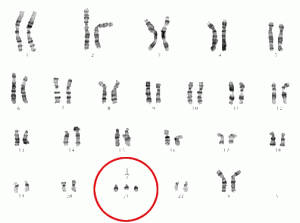Down Syndrome
What is Down syndrome?
Down syndrome is a genetic condition which is the most commonly occurring chromosomal condition. It occurs in one out of approximately 700 births and affects people of all races and socio-economic backgrounds.
Down syndrome occurs when an individual has three, rather than two, copies of the 21st chromosome. This additional genetic material alters the course of development and causes the characteristics associated with Down syndrome.

All people with Down syndrome experience cognitive delays, but the effect is usually mild to moderate and is not indicative of the many strengths and talents that each individual possesses.
People with Down syndrome are active participants in educational, vocational, social and recreational activities in their communities. They are included in general education classrooms, attend college, hold jobs, have friends and marry.
People with Down syndrome are valued members of their families and communities and contribute to society in a variety of ways. Remember that people with Down syndrome are more like everyone else than different.
Quality education programs; a stimulating home environment; good health care and positive support from family, friends and the community help people with Down syndrome to develop their full potential and lead fulfilling lives.
Learn More
Check out these resources from the National Down Syndrome Society for more information about Down syndrome:




